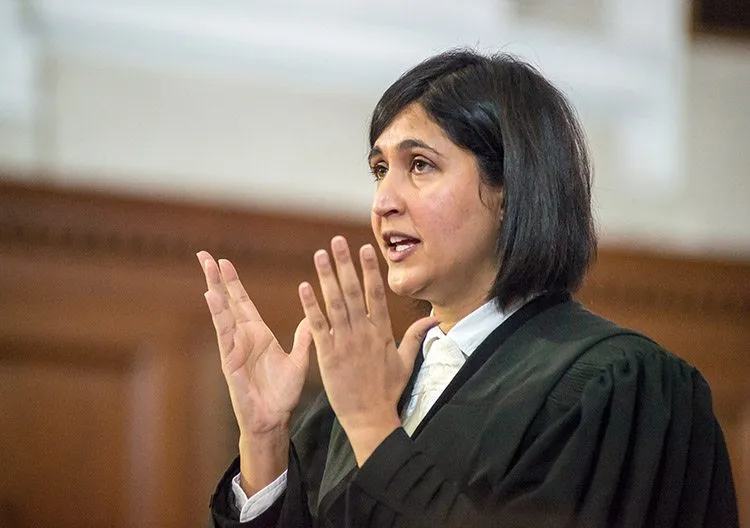Two weeks into the proceedings of the Madlanga Commission, it is already clear that much of the testimony being heard is guaranteed to give South Africans sleepless nights.
Allegations of a captured police minister, a “hitman” forging “special relationships” with top cops, and a sinister drug cartel with tentacles rising to the highest political ranks do not make for a comfortable night’s slumber for ordinary citizens.
But, if there is a silver lining in all this murk, it might be found in the reminder of the legal excellence the country still produces in spades, epitomised by the figures of evidence leader Adila Hassim and commissioner Sesi Baloyi.
Both senior counsel are emblematic of a post-apartheid legal vanguard that marries technical excellence with a fierce public ethic. One reflects her origins in public interest law and human rights; the other brings forensic precision and courtroom steel. Together, they give South Africans comfort that the proceedings of this all-important inquiry are in the safest possible hands.
The lawyer with a cause
Less than a fortnight into the commission’s hearings, evidence leader advocate Terry Motau unexpectedly quit. The commission has been mum on the reasons for his sudden departure, though he told 702’s Bongani Bingwa on Thursday, 2 October, that it was due to “to certain administrative issues”.
But effortlessly stepping into his shoes, albeit with significantly less-exciting outfits, came Hassim, who leavens her calm, methodical questioning with occasional flashes of humour – much needed in proceedings dominated by seemingly humourless career police officers.
She has even been able to tease out the occasional chuckle from the otherwise intensely earnest Crime Intelligence head, Lieutenant General Dumisani Khumalo, having established something of a running joke around his reluctance to interpret the emojis that pepper the transcripts of WhatsApp messages he had been reading to the commission this week.
But Hassim’s career is no laughing matter. A congenital fighter of good fights, Hassim has been one of the brains behind some of South Africa’s most vital and effective public interest projects as a cofounder of SECTION27 and a prominent presence in the Aids Law Project.
During the Life Esidimeni arbitration, while dissecting the ugly, unforgettable collapse of care that led to the deaths of scores of psychiatric patients, Hassim helped turn grief into reckoning, holding officials to account and insisting, in the manner of the very best advocates, that every procedural detail mattered because every detail was someone’s life.
/file/dailymaverick/wp-content/uploads/2024/12/15-11939628.jpg)
She won global fans through her work for South Africa at the International Court of Justice, taking on Israel for alleged violations of the Genocide Convention. Her ability to blend legal rigour with deeply human responses was on full display.
During a May 2024 hearing, Hassim grew visibly emotional in court, tearing up as she recounted the deaths of thousands of children and the suffering of Palestinian civilians. This public show of feeling told the world that this was a lawyer who is not scared to demonstrate empathy in a domain that too often treats people as case files.
At the Madlanga Commission, Hassim has her work cut out for her in helping retired Justice Mbuyiseli Madlanga, his two commissioners and the public at large to navigate an exceedingly confusing tale that sounds, at times, like a fever-dream conspiracy theory conjured by pathologically paranoid minds.
But if anyone is up to the task, it’s Adila Hassim.
/file/dailymaverick/wp-content/uploads/2025/10/ED_574254.jpg)
The interrogator with an even hand
If Hassim is the conscience of public interest law, Baloyi is its scalpel. Admitted as an attorney in the late 1990s and called to the Johannesburg Bar in 2005, Baloyi cut her teeth with Constitutional Court luminaries – including a stint as researcher to Justice Albie Sachs – and has since fashioned a reputation for meticulousness and an unshowy toughness that translates into results.
Baloyi’s distinctive greying braids – think of a more ethereal Tracy Chapman – have won her many declarations of love from the unhinged comment sections of the commission’s YouTube livestreams. But she is quite used to being in the public eye and all the adoration and vitriol that comes with it.
Baloyi rose to public prominence in her role on the Judicial Service Commission (JSC), the body responsible for interviewing judge candidates, to which President Cyril Ramaphosa appointed her in 2022. This has to go down as one of Ramaphosa’s wiser decisions because, at the time when Baloyi joined the JSC, it was at risk of becoming a clown show.
It was the period when commissioners Julius Malema and Dali Mpofu ran judge interviews as a kind of two-man show, terrorising candidates with aggressive grillings – in particular on the topic of race – that went well beyond what was necessary or justified. It resulted in many qualified candidates refusing to submit themselves to what they knew would be a traumatic and reputation-endangering ordeal.
/file/dailymaverick/wp-content/uploads/2025/09/ED_575109.jpg)
Baloyi’s entry at the JSC, together with that of fellow advocate Tembeka Ngcukaitobi, did a tremendous amount to restore dignity and gravitas to the body. She quickly developed a reputation for respectful but robust jurisprudential probing, restoring the focus of the interviews to the law away from the identity politics that had become its paramount preoccupation.
Speedily elected as the JSC’s spokesperson, Baloyi also had to take on the unenviable public-facing role of explaining some mysterious decisions from the body, such as the choice to maintain a Bench vacancy rather than recommend advocate and jurist David Unterhalter as a Constitutional Court justice. She did so in a way that somehow managed to inspire confidence despite sometimes questionable circumstances.
It is now Baloyi’s job, alongside fellow commissioners advocate Sandile Khumalo and Justice Madlanga, to sift through the testimony and evidence presented at the commission and make recommendations that could lead to criminal prosecutions of some of South Africa’s most powerful figures. In a land where assassinations of those trying to hold the corrupt to account seem to be on the rise, it is a gig many would be fearful to take on.
But not much seems to rattle Baloyi – thankfully, for the rest of us. DM
This story first appeared in our weekly Daily Maverick 168 newspaper, which is available countrywide for R35.





 Advocate Adila Hassim SC. (Photo: Daily Maverick)
Advocate Adila Hassim SC. (Photo: Daily Maverick)